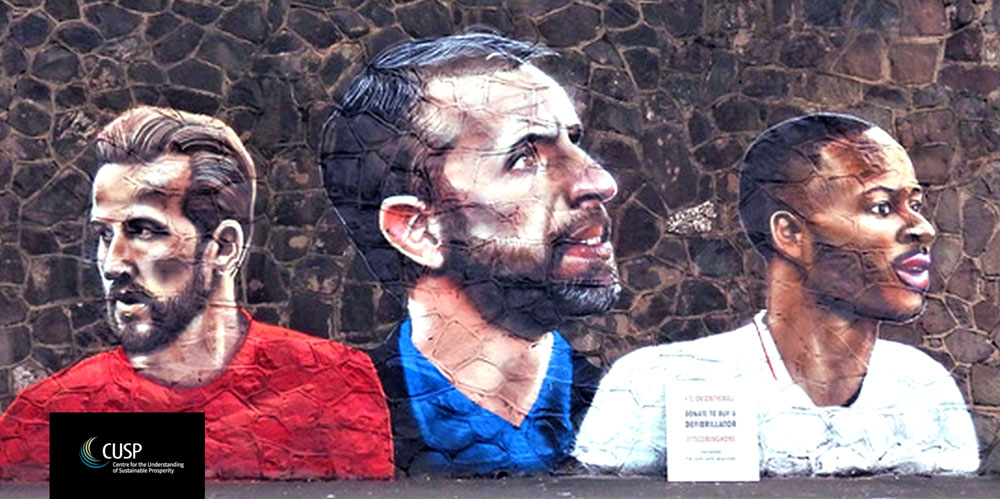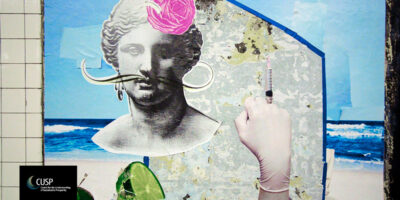A new England: After 25 more years of hurt have the new lads finally grown up?
The England football team may not have won the country a new trophy, but they have given us something more valuable. Gareth Southgate’s England squad exhibit an ethics of care that is unusual in both football and male-dominated space more generally. This England team has valuable lessons for their fans and English society at large. But to understand how profound this shift was, we must first consider the historical context.
By BEN GALLANT

From Skinheads to Skinner and Baddiel
There are many similarities between the European championship of 1996 and 2020. Euro 96 was a moment of hope in English football, after many years of disappointing performances. Like Euro 2020, England had a strong team, a home advantage and of course Gareth Southgate. Both tournaments are also likely to be remembered as a step towards a more open and inclusive football culture.
Euro 96 was the first competition in years that England fans felt comfortable flying the St George’s cross, having mostly opted for the Union Jack before in previous competitions. Originating in the 1960’s, and peaking in the 1980’s, the England flag had grown to be associated with the far right. The EDL [English Defence League] and skin heads used the flag to spread their message of hate and exclusion. For many people, both in England and abroad, the flag became a symbol of hate. Euro 96 changed this meaning for a large portion of the English public.
Euro 96 was a step towards a less nationalistic, more inclusive, England, but it was far from a complete resolution. For many the legacy of hate lingered. For example, the journalist Carl Anka—a black British-Ghanaian—has spoken publicly about his trepidation towards people carrying the flag lasting until the 2018 World Cup. So, while the portion of the population who identified with the team was expanding, many still felt excluded.
At the same time, 90’s football culture was dominated by the ‘new lads’ movement, a cultural shift among young men, centred on football, drinking culture and a broadly ‘post-feminist’ attitude. Contrary to the narrative suggested by the reclaiming of the flag, this period was a step backwards for English football culture. Far from rejecting the worst elements of past fans behaviour, the new lads (an essentially middle-class movement) used the cloak of irony to spread them to the gastro pubs and universities.
Irony has been identified as an important part of lad culture; the idea that the participants are knowing and some sense better than the way they are behaving is pervasive. This is the same use of irony that has become so common in politics recently. It creates a space for people to overstep the lines of decency while maintaining an escape route, a thin veneer of deniability. As with the political uses of irony, it is best to take people at their word. Football fans were still using the language of exclusion and they still meant it.
One of the most enduring legacies of Euro 96 was Three Lions (Football’s Coming Home) by David Baddiel, Frank Skinner and The Lightning Seeds. It reached number one during the tournament, and exemplifies this partial transition. As Frank Skinner recently explained, the song is inextricable from the ‘new lads’ movement and I think we see this mostly clearly in the ‘thirty years of hurt’.
Skinner and Baddiel were expressing something in this song that they felt, and that others resonated with. When they sang of ‘30 years of hurt’, this was in itself an admission of ‘care’. To care so deeply about something so arbitrary as a football game is both deeply human and deeply admirable. However, the song provides a protective coating of irony, allowing fans to share their true feelings whilst remaining distant enough to never truly reconcile with them.
More importantly though, is the self-centredness of the phrase. There is something a little petulant about the line, which, coupled with the freedom that irony gives people to walk back their feelings, leaves us in a very uncomfortable middle ground. The line creates a space where fans can be over dramatic and self-pitying without actually expressing their deep feelings of care. This is typical of the emotionally repressed masculinity of the new lads that pervaded 90’s football.
25 More Years of Hurt
Euro 96 was also a very important moment for Gareth Southgate, whose miss from twelve yards in sudden death of the penalty shootout against Germany has haunted him ever since. It was Southgate’s miss that was the cause of England’s elimination from that tournament, the first held on home soil since their triumph in ’66.
However, Southgate’s hurt is not the hurt of not being able to lord his win over his opponents or identify personally with a great victory; it is a hurt of seeing your teammates let down. Southgate articulates an other-centred understanding of hurt, and for this, his 25 years have had a much more powerful redemption arc than Skinner and Baddiel. A focus on relationships, empathy, and responsibility to others is clearly at the core of Southgate’s coaching style. This approach comes across every time he talks to the media, and it is very apparent in his players.
After the England-Germany game, he was asked about what the performance meant to him, and responded:
“I was looking at the big screen and I saw Dave Seaman… For my team-mates that played with me I can’t change that [the penalty miss in ’96] so it will always hurt. But what is lovely is we have given people another day to remember and now we have to do it in Rome.”
The sense that this team has a reason to fight extends well beyond Southgate. We see this in the taking of the knee before games, a gesture that has to be understood as deeply personal to at least some of the players. While the symbolism of the knee has been criticised as superficial by both those on both the left and right (but, let’s be honest, mostly the right), this is the same England team that starred Danny Rose, who went to Russia without his family for fear of racial abuse. It is also the team which prominently stars Raheem Sterling, who has faced a torrent of unimaginable racial abuse throughout his career (see this for example). Far from a vague expression of ‘wokeness’, the taking of the knee is, for many in this team, a direct expression of their lived experience.
For Raheem Sterling, success doesn’t just mean doing well for his country. It means proving his critics wrong and showing the children of this country that, despite the hate people who look like him may receive, they can succeed at the top of sport (a message that he delivered quite beautifully in this article). This is not to say that having something to fight back against is necessary for a team to succeed, and certainly not to say that Raheem is a better player because of the hate he receives. Rather, I am saying that for the first time, the England squad has a legitimate claim to the ‘years of hurt’. Equally importantly, they seem to have found a way to live with that hurt.
The Ethics of Care
Led by Gareth Southgate, the Euro 2020 squad exhibits an ethic of care in their communication with the press and the way they relate to one another. The ethics of care is a philosophical concept with roots in academic feminism. It focuses on the importance of interpersonal relationships and the social and emotional responsibilities we have to one another. In this sense it is the absolute negation of brashly unapologetic and self-absorbed masculinity of the new lads movement.
For want of a better phrase, Southgate’s England has replaced the ‘new lads’ with the ‘new dads’. Fatherhood is not just a literal fact of many of the players home lives but a core characteristic of their style. The team is caring, other-focused and supportive. This is true of players like Rashford, who does not have children, but present themselves as role models, campaigners and protectors of children.
England’s current side performs care at every opportunity. In every interview, players recognise they are part of a team, take the time to recognise their colleagues who were unable to play and support those who are struggling. Southgate understands his players as human beings and has enough respect for them to treat them as adults. In his own words, ‘respect’ and ‘trust’ are the ‘bedrock of everything’ he is working to build. This spirit was exemplified by Jordan Henderson’s Twitter response to a non-binary fan at the start of the tournament.
Southgate’s response to the booing of the team taking the knee in press conferences after the friendly games that preceded this year’s tournament was a calm, quiet but firm assertion of his and his team’s values. He did not lash out in anger, nor did he back down in fear. He stood firm in solidarity with his players. This is masculinity at its best. These are the qualities of a father figure. In embodying these qualities, Southgate leads his team, and his team leads the nation’s men, away from the banter of lads and towards the character of dads.
This is not to say that women cannot embody the characteristics I have just described. Obviously, there are women who stand up for one another every day. What I am trying to suggest here is that as a role model for young men, we could do a lot worse than Gareth Southgate and his England team. This is a vital role for the culture right now as the new lads movement has far from dissipated. While England’s football team has grown up, much of its politics, economics and culture have regressed.
A New England
Football culture still has a range of problems: from the appalling statistics about domestic violence to the abuse of players on social media, football fans still have a long way to go. Euro 2020 has once again showcased the worst of English football culture. From the horrible laser pointer incident to the disrespectful booing of opposing teams, and most troublingly, the continued racism towards fans and players. The supports have not lived up to their national team, but we cannot address football in isolation. This brash uncaring culture is much broader.
Throughout Euro 2020, both manager and players constantly emphasised the contribution of the players who have not had time on the pitch. Southgate especially has sought to acknowledge the importance of those whose work was not in front of the cameras, and to even challenge what we had previously thought of as work in the context of a football team. It is the maintenance work of training and the emotional work of leading and caring.
The work of maintenance and reproduction is often undervalued, not just in football but across our society. Like the contributions of players off the pitch, people whose work consist of maintenance and care are undervalued and unseen until we shine a light on them and see how truly important they are. In football, Gareth Southgate was that light; in society at large, it was the pandemic. Yet this week, we learnt that a million children of key workers live in poverty. For all the rhetoric and clapping, our economic system still fails to care for those who care for us. Gareth Southgate may have learnt to value care work, but the rest of country has not.
Throughout the pandemic, key workers have been lauded as ‘heroes’ engaged in valiant self-sacrifice in service of the greater good. Like foot soldiers in war, they were expected to put themselves on the line the for the good of the nation. But when they need our support, they are left to fend for themselves. Key workers don’t need us to treat them as heroes—like Southgate’s team, they need our solidarity.
Coming Home?
Football may not be coming home anymore, but the question remains: can we? Can we return from our fifty-five years of hurt and realise that it was self-induced all along? Come back to where we belong, back to family, back to community—come home. Southgate gives me hope that other men will be able to come through lad culture with their integrity and their ability to care intact. Possibly more importantly, Southgate’s team give me hope that the men of the future will be able to avoid lad culture entirely.
Like the football of the ‘90s, the English economic system lacks a sense of purpose. The motive of personal striving towards personal gain has left the nation directionless. In a sense, it is positive that England did not win on Sunday; that would only have served to support the most jingoistic and superficial impulses. But maybe in defeat, we can learn from this team about what is really important.
To begin with, we will have to address the way that our economic system is at odds with the ethic of care. We need an economy and a culture that recognises everyone’s contribution, especially those who work behind the scenes to care for us all. Like the England team, we can find our purpose in striving towards the best for one another. This is not about celebrating individual sacrifice to achieve a ‘greater good’, but everyone contributing towards a common good. It is also about recognising everyone’s contribution (on or off the pitch) and everyone’s right to partake in that common good. That is an England that I can support.
Acknowledgments
Thanks to Amardeep Chawla for their inciteful comments and provocations, and Max Edwards for contributing his football knowledge and editing skills. However, the opinions expressed here as well as any remaining mistakes are entirely my own.



